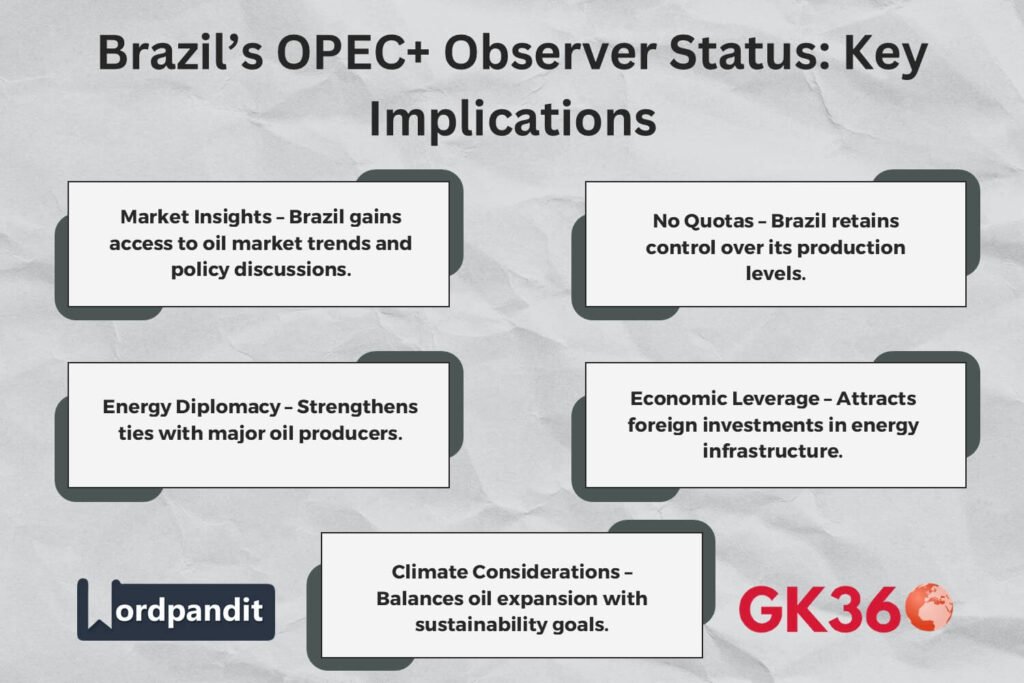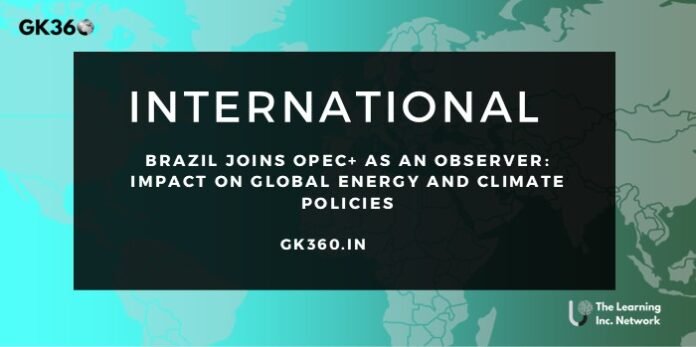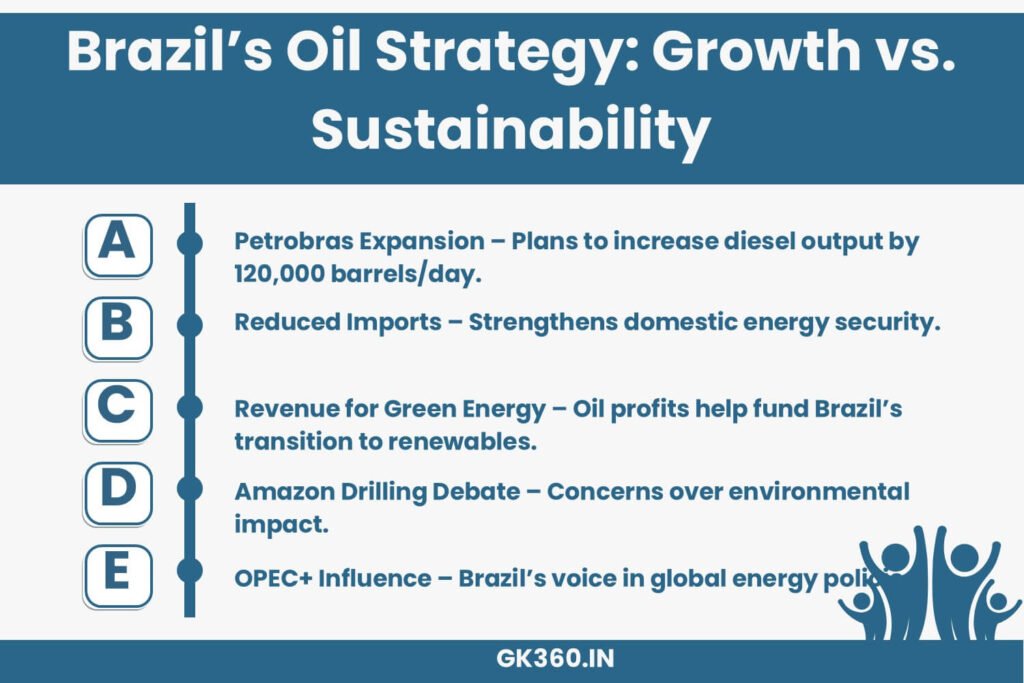Brazil Joins OPEC+ as an Observer: Impact on Global Energy and Climate Policies

Table of Contents
- Introduction
- Brazil’s OPEC+ Observer Status: What It Means
- Strategic Benefits for Brazil’s Energy Sector
- Challenges and Criticism: Balancing Oil and Climate Goals
- Petrobras’ Expansion Plans and Market Impact
- Global Implications: How Brazil’s Move Affects Oil Prices and Policies
- FAQs
- Conclusion: A Strategic Step Toward a Balanced Energy Future
Introduction
Brazil has officially taken a significant step in its energy policy by joining the OPEC+ alliance as an observer. This move, approved by the National Council for Energy Policy, allows Brazil to engage in discussions with major oil-producing nations while maintaining sovereignty over its production levels.
With Brazil set to host the United Nations Climate Summit, this decision raises questions about the country’s balancing act between energy security and environmental sustainability.
Brazil’s OPEC+ Observer Status: What It Means
Brazil’s decision to become an observer in OPEC+ means the country can participate in discussions on global oil policies without being bound by production quotas. This gives Brazil a platform to collaborate with major energy players while preserving its autonomy in setting domestic production levels.
According to Mines and Energy Minister Alexandre Silveira, Brazil aims to gain insights into market trends and oil price stability while ensuring its national interests remain safeguarded. Unlike full OPEC+ members, Brazil retains flexibility in adjusting its oil policies based on economic needs.
Strategic Benefits for Brazil’s Energy Sector
Joining OPEC+ as an observer aligns with Brazil’s broader strategy to strengthen its global energy presence. As one of the world’s top oil producers, Brazil seeks to:
- Advocate for stable oil prices to support economic growth.
- Strengthen diplomatic ties with key oil-producing nations.
- Secure foreign investment in its energy infrastructure.
- Position itself as a leader in sustainable energy initiatives within the oil sector.
Challenges and Criticism: Balancing Oil and Climate Goals
While Brazil sees economic advantages in engaging with OPEC+, environmental activists have raised concerns about the country’s continued reliance on fossil fuels. A major point of contention is Brazil’s oil exploration near the Amazon River, a project criticized by climate advocates for its potential environmental impact.
President Luiz Inácio Lula da Silva has responded by emphasizing that revenues from oil production will help finance Brazil’s transition to green energy. He also believes Brazil’s involvement in OPEC+ could encourage other oil-rich nations to reinvest profits into sustainable energy solutions.
Petrobras’ Expansion Plans and Market Impact
Petrobras, Brazil’s state-controlled oil company, is set to increase diesel production by 120,000 barrels per day in 2025. This expansion aims to:
- Reduce Brazil’s reliance on fuel imports.
- Strengthen energy security.
- Boost government revenues for reinvestment in renewable energy.
However, Petrobras has faced production challenges, reporting a 10.5% drop in total oil and gas output in Q4 2024. This decline is attributed to maintenance issues and unexpected offshore platform shutdowns.
Global Implications: How Brazil’s Move Affects Oil Prices and Policies
Brazil’s participation in OPEC+ discussions could influence global oil price stability and production strategies. While Brazil is not obligated to follow production quotas, its involvement:
- Strengthens OPEC+ as an organization with growing influence.
- Provides a counterbalance to major producers like Saudi Arabia and Russia.
- Creates opportunities for Brazil to shape global energy transition discussions.
FAQs
Why is Brazil joining OPEC+ as an observer?
🔹 Brazil aims to participate in global oil discussions while maintaining autonomy over its production policies.
How will this impact Brazil’s oil production?
🔹 Brazil will gain market insights and diplomatic leverage without being subject to OPEC+ quotas, allowing it to align production with domestic economic goals.
What does this mean for Brazil’s climate commitments?
🔹 While increasing oil production, Brazil plans to use revenue to invest in renewable energy, balancing economic and environmental priorities.
How does Petrobras fit into this strategy?
🔹 Petrobras’ expansion efforts support national energy security and economic growth while funding Brazil’s green energy transition.
What are the economic benefits of Brazil’s OPEC+ role?
🔹 Brazil can advocate for stable oil prices, attract foreign investments, and strengthen its influence in global energy policies.
Conclusion: A Strategic Step Toward a Balanced Energy Future
Brazil’s entry into OPEC+ as an observer reflects a calculated decision to secure its position in the global energy market while preserving its policy independence. As Brazil prepares to host the UN Climate Summit, its approach to balancing oil production with sustainability will remain under close scrutiny.
This move is not just about energy security—it’s a diplomatic tool that can shape both Brazil’s economic future and global energy transitions.
Key Takeaways Table
| Aspect | Details |
|---|---|
| Brazil’s OPEC+ Role | Observer status allows participation in discussions without production quotas. |
| Economic Benefits | Access to market trends, diplomatic leverage, and foreign investments. |
| Petrobras Expansion | Plans to boost diesel output by 120,000 barrels/day by 2025. |
| Climate Commitment vs. Oil Growth | Oil revenues to support renewable energy transition, but Amazon drilling faces criticism. |
| Global Influence | Strengthens OPEC+ as a major energy body and gives Brazil a voice in oil pricing strategies. |
| Energy Security | Reduced dependence on fuel imports and strengthened domestic supply. |
| UN Climate Summit Context | Brazil’s OPEC+ participation sparks debate on its climate and energy policies. |
Related Terms:
- Brazil OPEC+ Observer
- Brazil Oil Market Strategy
- Petrobras Expansion Plan
- Brazil Energy Policy 2025
- OPEC+ Global Oil Prices
- Climate Impact of Oil Expansion
- Brazil Fossil Fuels vs. Renewables
- UN Climate Summit 2025 Energy Policy
- Sustainable Oil Investment Brazil
- Brazil’s Role in Global Energy Market






